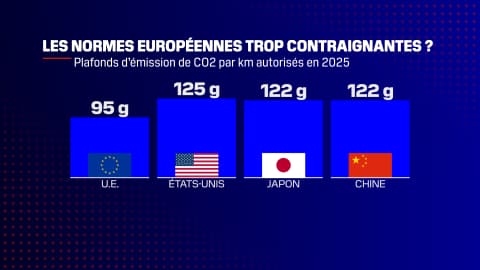The European car industry is in a state of panic. New CO2 emissions regulations will come into force on 1 January and some manufacturers fear an industrial disaster.
Starting with Renault, apparently the source of an anonymous document that has been circulating in the corridors of Brussels for several days. In this very alarmist note, the author advocates the postponement of a CO2 emissions standard planned for next year through Article 122.1 of the Treaty on the Functioning of the European Union (TFEU), a kind of European “49.3”, as indicated by The world.
What is this standard of contention? It is called CAFE, an acronym for Corporate average fuel economy and will force manufacturers to sell in Europe only vehicles that emit an average of 95 grams of CO2 per kilometre. Under penalty of a fine of 95 euros per gram of excess and per new vehicle sold. As a reminder, the threshold was set at around 116 grams on average this year.
Specifically, if a manufacturer exceeds the authorised threshold by 5 grams and sells 1 million vehicles a year, it will have to pay a fine of 475 million euros.
An unattainable goal for electric vehicles?
The problem is that many manufacturers such as Renault or Volkswagen are currently far from the mark. You should know that today the cleanest thermal vehicles emit around 120 grams of CO2 per km. To balance the books, one in five electric vehicles would have to be sold to reduce average emissions by 20%.
And we are currently far from that figure, as the share of electric vehicles did not exceed 15% of the total in 2024 and even fell to 12% this summer in a context of reductions by States in purchase subsidies.
From then on, several possible scenarios arise for manufacturers: either the rule is not relaxed and the manufacturers who do not comply with the rules pay all their fines, for a total amount estimated by Renault at 13 billion euros.
Or the pace of production at thermal vehicle factories will have to be slowed down, reducing output by two million units, which could lead to the closure of eight plants in Europe, according to Renault’s statement.
Or, finally, manufacturers buy carbon credits (the right to pollute) from electric specialists, mainly American or Chinese competitors such as Tesla or Geely. This means that these non-EU manufacturers are subsidised by European manufacturers. This may seem absurd at a time when the EU is planning to increase its customs duties precisely to limit imports of foreign vehicles.
Are European standards too ambitious?
It is not only in Europe that manufacturers are subject to CO2 emission standards. Furthermore, this CAFE standard is originally from the United States. The first threshold was in force in 1978, and in that year vehicles were not allowed to exceed… 248 grams of CO2 per kilometre.
Europeans adopted a common standard in 1992. In recent years, a schedule of emissions restrictions has made the continent the most demanding economic zone. While new vehicles sold in Europe cannot exceed 95 grams of CO2/km, the authorised limit is set at over 120 grams in the United States, Japan or China.

And this is just one stage, as the thresholds will be lowered again in the coming years until reaching 0 grams in 2035, the year in which no new thermal vehicles can be sold on the continent.

A timetable opposed by many manufacturers such as Renault, who consider it detrimental to European industry. Until now, they had the attentive and understanding ear of the European Commissioner for Industry, Thierry Breton, who considered that these rules risked decriminalising the competitiveness of European companies in the sector. With the departure of the former French minister from the European Commission on Monday, the manufacturers have lost significant support.
Source: BFM TV

